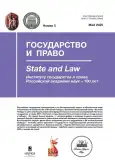Protection of the Fatherland as a constitutional value in the projection of historical truth
- Authors: Vinogradova E.V.1
-
Affiliations:
- Institute of State and Law of the Russian Academy of Sciences
- Issue: No 5 (2025)
- Pages: 114-120
- Section: Constitutional law of Russia
- URL: https://journal-vniispk.ru/1026-9452/article/view/306957
- DOI: https://doi.org/10.31857/S1026945225050106
- ID: 306957
Cite item
Abstract
The concept of protecting the Fatherland, which is complex in its constitutional and legal nature and synthesizes many state-forming principles, has become the subject of historical, legal, and philosophical scientific research in recent years. The relevance of the research is predetermined by the adoption of a Presidential Decree declaring 2025 the Year of Defender of the Fatherland in order to preserve historical memory, in commemoration of the 80th anniversary of Victory in the Great Patriotic War of 1941–1945, in gratitude to veterans and recognizing the feat of participants in a special military operation. The article examines the reflection in the constitutional priorities of the importance of ensuring guarantees for the protection of the independence and security of our country, patriotism, and the continuity of generations. The guarantees of the protection of the constitutional order, independence and security of the Russian state are being considered. The article analyzes the constitutional provisions that determine the importance of preserving historical memory, on which relationships between individuals, society, and the state are based in modern Russia.
About the authors
E. V. Vinogradova
Institute of State and Law of the Russian Academy of Sciences
Author for correspondence.
Email: evsfrf@gmail.com
10 Znamenka str., 119019 Moscow, Russia
References
- Belinsky V. G. The history of Little Russia by Nikolai Markevich. M., L., 1926. P. 398 (in Russ.).
- Vinogradova E. V., Danilevskaya-Urbanova I.L., Rattur M. V. Political and legal foundations of the formation of a new world order in the context of the results of the Yalta (Crimean) Conference of the three Powers in 1945 // Legal policy and legal life. 2025. No. 1. P. 145 (in Russ.).
- Gorban V. S. A new historiography of political and legal thought as an urgent task of the legal sciences // Herald of Kutafin University (MSAL). 2023. No. 4 (104). P. 100 (in Russ.).
- Documents of the Yalta Conference // Yalta-45. The Outlines of a New World / ed. by N. A. Narochnitskaya. M., 2010. Pp. 115, 121 (in Russ.).
- Zhukov V. I., Rattur M. V. Interpretations of the Katyn Massacre in the context of the protection of historical truth as a constitutional value // Legal policy and legal life. 2024. No. 2. P. 309 (in Russ.).
- History of international relations and foreign policy of the USSR. Vol. III. 1945–1963 / ed. by V. G. Trukhanovsky. M., 1964. P. 6 (in Russ.).
- Kersnovsky A. A. History of the Russian Army. M., 2023. P. 140 (in Russ.).
- Nikonov V. A. Report at the Round Table “Lessons of the Crimean (Yalta) Conference of the Leaders of the Three Allied Powers (February 4–11, 1945)” // Lessons of the Crimean (Yalta) Conference of the Leaders of the Three Allied Powers (February 4–11, 1945): materials of the Round Table on February 6, 2015. M., 2015. P. 9 (in Russ.).
- Pechatnov V. O., Magadeev I. E. Correspondence of I. V. Stalin with F. Roosevelt and W. Churchill during the Great Patriotic War. Documentary research. M., 2015. Vol. 1. P. 12 (in Russ.).
- Polyakov Yu. A. Why doesn’t history teach us? // Questions of history. 2001. No. 2. P. 22 (in Russ.).
- Savenkov A. N. State and law. Human rights and the world order based on the rule of law: in 3 vols. M., 2021. Vol. 1 (in Russ.).
- Savenkov A. N. Nuremberg: A verdict for name of Peace. M., 2021. P. 58 (in Russ.).
- Savenkov A. N. Philosophy of Law and the formation of the Russian state-civilization. M., 2024. P. 156 (in Russ.).
- The Soviet Union at International conferences during the Great Patriotic War 1941–1945: collection of documents: in 6 vols. Vol. IV. The Crimean Conference of the leaders of the three Allied Powers – the USSR, the USA and Great Britain (February 4–11, 1945). M., 1984. Pp. 140, 141 (in Russ.).
- One hundred and forty conversations with Molotov: From the diary of F. Chuev. M., 1991. P. 378 (in Russ.).
- Human capital during the Great Patriotic War: features of formation and development / [V. I. Zhukov et al.]. M., 2011. P. 137 (in Russ.).
- Ebzeev B. S. Constitution of the Russian Federation: direct action and conditions of implementation // State and Law. 2008. No. 7. P. 13 (in Russ.).
- Yurchenko S. V. The Yalta Conference of 1945: principles of negotiations, significance, lessons // Herald of the Moscow University. Ser. 25. International Relations and World Politics. 2010. No. 1. P. 127 (in Russ.).
Supplementary files










